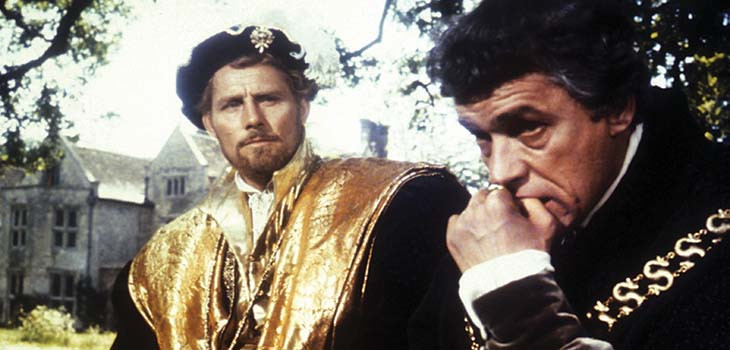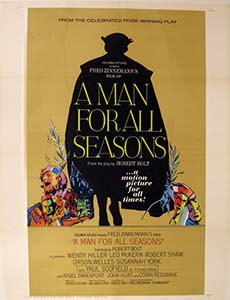*/

Scripted by Robert Bolt from his play of the same name and directed by Fred Zinnemann (not in this instance by David Lean), A Man for All Seasons depicts the final years of Sir Thomas More, Lord Chancellor of Britain and quintessential man of integrity and letters.
A lawyer of great conscience, as most will (or should) know, he refused to sign a letter asking Pope Clement VIII to annul the marriage of Catherine of Aragon to Henry VIII and recognise the King by way of an oath of supremacy as Head of the Church of England. The only member of the Privy Council to oppose Wolsey’s (played here by Orson Welles) attempts to obtain an annulment from the Pope, on Wolsey’s death and promotion to Lord Chancellor More continues to resist the King (Robert Shaw) and his threats, tantrums and promises of royal favour. Richard Rich (John Hurt) and Thomas Cromwell (Leo McKern) plot to bring More down.
More is played impeccably by one of the more intermittent of the great screen and stage actors England has produced, Paul Scofield. Many were reluctant to give him the part. How wrong they were; the film scored six Academy Awards including Best Picture, Best Director and Best Actor for Scofield.
Integrity is of the ages and the film’s lessons are profound for our time. A Lord Chancellor acting with principle and integrity, a steadfast man of the law and a gatekeeper of the system. The sense of conscientious objection, the drawing of lines and markers of principle when ‘enough is enough’ – ultimately, at the cost of his head after a corrupt trial.
It is vitally important within any corrosive establishment to preserve those who Just Say No. There are other examples, notable for their rarity. Erwin Rommel, when he ultimately supported the plot against Hitler, is analogous. Rommel suffered a more private execution; a pill in the back of a car.
In a sense, More subscribed to the Bingham Principle of being an independent executive officer. The system breaks down when those who are the gatekeepers no longer uphold the law. It is an increasingly important issue for lawyers in high office at the present time to maintain a modicum of integrity, principle and moderation within office.
Now, acting on principle should not be confused with self-immolation or martyrdom. To walk away and live to fight another day is most often the prudent course of action. Ideally, establish the point vigorously then disassociate before it is too late. If you can. Many, such as More or Rommel, become trapped in an ever-worsening establishment and often fail to fully appreciate the gravity of matters when decency and honour no longer apply. They become victims of principle. By being principled.
The crucial modern text in respect of principle and moderation is, in my view, by the greatest man of letters of the 20th century. It is Camus’ The Rebel (1951). The rebel only in that he or she believes in form, rationality, argumentation, secular or Christian humanism and that odd word ‘decency’. In a world of severe threats to the cause of human rights moderation is needed to protect the vulnerable, whoever they are and wherever they come from.
More wrote, of course, an anti-dystopian text Utopia (1516) which is now part of the moderation of the anti-transhumanist zeitgeist. The voice in the wilderness. Well, what is wrong with peace, love, understanding and a measure of social democracy and/or integrity? That is the lesson of A Man for All Seasons. And as we unite in mourning of another person of conscience, principle and reason, Her Majesty Queen Elizabeth II, we are reminded to be more (not less) than your office – as she was.


Scripted by Robert Bolt from his play of the same name and directed by Fred Zinnemann (not in this instance by David Lean), A Man for All Seasons depicts the final years of Sir Thomas More, Lord Chancellor of Britain and quintessential man of integrity and letters.
A lawyer of great conscience, as most will (or should) know, he refused to sign a letter asking Pope Clement VIII to annul the marriage of Catherine of Aragon to Henry VIII and recognise the King by way of an oath of supremacy as Head of the Church of England. The only member of the Privy Council to oppose Wolsey’s (played here by Orson Welles) attempts to obtain an annulment from the Pope, on Wolsey’s death and promotion to Lord Chancellor More continues to resist the King (Robert Shaw) and his threats, tantrums and promises of royal favour. Richard Rich (John Hurt) and Thomas Cromwell (Leo McKern) plot to bring More down.
More is played impeccably by one of the more intermittent of the great screen and stage actors England has produced, Paul Scofield. Many were reluctant to give him the part. How wrong they were; the film scored six Academy Awards including Best Picture, Best Director and Best Actor for Scofield.
Integrity is of the ages and the film’s lessons are profound for our time. A Lord Chancellor acting with principle and integrity, a steadfast man of the law and a gatekeeper of the system. The sense of conscientious objection, the drawing of lines and markers of principle when ‘enough is enough’ – ultimately, at the cost of his head after a corrupt trial.
It is vitally important within any corrosive establishment to preserve those who Just Say No. There are other examples, notable for their rarity. Erwin Rommel, when he ultimately supported the plot against Hitler, is analogous. Rommel suffered a more private execution; a pill in the back of a car.
In a sense, More subscribed to the Bingham Principle of being an independent executive officer. The system breaks down when those who are the gatekeepers no longer uphold the law. It is an increasingly important issue for lawyers in high office at the present time to maintain a modicum of integrity, principle and moderation within office.
Now, acting on principle should not be confused with self-immolation or martyrdom. To walk away and live to fight another day is most often the prudent course of action. Ideally, establish the point vigorously then disassociate before it is too late. If you can. Many, such as More or Rommel, become trapped in an ever-worsening establishment and often fail to fully appreciate the gravity of matters when decency and honour no longer apply. They become victims of principle. By being principled.
The crucial modern text in respect of principle and moderation is, in my view, by the greatest man of letters of the 20th century. It is Camus’ The Rebel (1951). The rebel only in that he or she believes in form, rationality, argumentation, secular or Christian humanism and that odd word ‘decency’. In a world of severe threats to the cause of human rights moderation is needed to protect the vulnerable, whoever they are and wherever they come from.
More wrote, of course, an anti-dystopian text Utopia (1516) which is now part of the moderation of the anti-transhumanist zeitgeist. The voice in the wilderness. Well, what is wrong with peace, love, understanding and a measure of social democracy and/or integrity? That is the lesson of A Man for All Seasons. And as we unite in mourning of another person of conscience, principle and reason, Her Majesty Queen Elizabeth II, we are reminded to be more (not less) than your office – as she was.



The Chair of the Bar sets out how the new government can restore the justice system
In the first of a new series, Louise Crush of Westgate Wealth considers the fundamental need for financial protection
Unlocking your aged debt to fund your tax in one easy step. By Philip N Bristow
Possibly, but many barristers are glad he did…
Mental health charity Mind BWW has received a £500 donation from drug, alcohol and DNA testing laboratory, AlphaBiolabs as part of its Giving Back campaign
The Institute of Neurotechnology & Law is thrilled to announce its inaugural essay competition
How to navigate open source evidence in an era of deepfakes. By Professor Yvonne McDermott Rees and Professor Alexa Koenig
Brie Stevens-Hoare KC and Lyndsey de Mestre KC take a look at the difficulties women encounter during the menopause, and offer some practical tips for individuals and chambers to make things easier
Sir Geoffrey Vos, Master of the Rolls and Head of Civil Justice since January 2021, is well known for his passion for access to justice and all things digital. Perhaps less widely known is the driven personality and wanderlust that lies behind this, as Anthony Inglese CB discovers
The Chair of the Bar sets out how the new government can restore the justice system
No-one should have to live in sub-standard accommodation, says Antony Hodari Solicitors. We are tackling the problem of bad housing with a two-pronged approach and act on behalf of tenants in both the civil and criminal courts